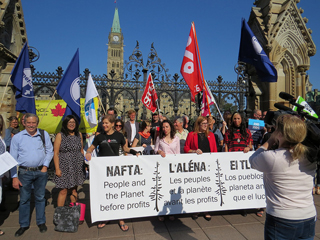Since the North America Free Trade Agreement (NAFTA) was signed more than two decades ago, our awareness of climate change has dramatically changed and our window of time for addressing it has shortened. NAFTA and other agreements that are part of the global trade regime have been used to undermine critical actions needed to respond to the climate crisis that help rebuild local economies, regulate corporations and stop damaging extractive projects.
We need a fundamental shift in how we approach trade – one that puts the needs of people and the planet first.
Canada has signaled its intention to bring climate into NAFTA talks. As leading environmental, climate, health, labour and faith organizations, we urge the federal government to address the environmental failings of NAFTA in the upcoming renegotiation process.
We call on the federal government to do the following:
- Remove NAFTA’s Chapter 11 Investor-State Dispute Settlement (ISDS) provisions. This chapter gives private investors the right to sue the government of another country if it introduces new laws, regulations or practices – be they environmental, health or human rights – that cause corporations to lose money on their investments.
Canada has faced 38 NAFTA Chapter 11 investor-state suits, two-thirds of them over environmental protection laws. This includes bans on environmentally harmful additives to gasoline, exports of hazardous PCBs and lawn pesticides, as well as a moratorium on fracking. Canada is currently facing nine ISDS claims where foreign investors are seeking more than $6 billion in damages from the Canadian government. - Eliminate NAFTA’s energy chapter. The climate crisis requires governments to have a full range of policy and regulatory options to reduce climate pollution as quickly and as equitably as possible. The proportional sharing clause in the energy chapter requires Canada to export a locked-in percentage of our energy production to the U.S. This limits Canada’s ability to restrict climate-polluting fossil fuels, including tar sands (oil sands) crude.
NAFTA rules stand in the way of fostering solutions to the climate crisis. NAFTA national treatment rules threaten policy options such as renewable portfolio standards, low carbon fuel standards, and other climate-friendly energy regulations perceived as impeding business for foreign fossil fuel firms. NAFTA’s procurement rules limit governments’ ability to use “green purchasing” requirements that ensure government contracts support renewable energy, energy efficiency and sustainable goods.
Instead of protecting corporate interests in ongoing fossil fuel exploitation, trade agreements should shield public interest policies. Trade deals must create a fair playing field by requiring each participating country to adopt, maintain, and implement policies to ensure compliance with domestic environmental laws and important international environmental and labour agreements. These include the Paris Climate Agreement and treaties protecting Indigenous rights such as the United Nations Declaration on the Rights of Indigenous Peoples. Strong enforceable environmental and labour standards should be part of the core text of NAFTA.
 This statement is signed by the following organizations:
This statement is signed by the following organizations:
- 350.org
- Canadian Association of Physicians for the Environment (CAPE)
- Canadian Environmental Law Association (CELA)
- Canadian Federation of Students (CFS)
- Canadian Union of Postal Workers (CUPW)
- Canadian Unitarians for Social Justice (CUSJ)
- Central Athabasca Stewardship Society
- Climate Action Network (CAN)
- Climate Change in Focus
- Common Frontiers
- Confédération des syndicats nationaux (CSN)
- Council of Canadians
- Ecology Action Centre
- Ecology Ottawa
- For Our Grandchildren
- Friends of the Earth Canada
- Glasswaters Foundation
- Grand Riverkeeper Labrador, Inc.
- Green Economy Network
- Greenpeace Canada
- KAIROS: Canadian Ecumenical Justice Initiatives
 Lead Now
Lead Now- Manitoba Wildlands
- Mining Watch
- Mobilisation environnement Ahuntsic-Cartierville (MEAC)
- Montréal pour tous
- National Farmers Union (NFU)
- National Union of Public and General Employees (NUPGE)
- Ontario Rivers Alliance
- People’s Climate Movement (Canada)
- Registered Nurses’ Association of Ontario (RNAO)
- Regroupement vigilance hydrocarbures Québec (RVHQ)
- Sierra Club BC
- Sierra Club Canada Foundation
- Trade Justice Network (TJN)
- Transition Initiative Kenora (TIK)
- The Leap
- Unifor
- Watershed Environmental Educational Society (WSES)
- Windfall Ecology Centre